Rev. Sun Myung Moon
(References and excertps from the New World Encyclopedia)
Sun Myung Moon (문선명, 文鮮明), (February 25, 1920 (lunar: January 6, 1920) – September 3, 2012), was born in North Pyeongan Province, which is now part of North Korea. He founded the Unification Church (known formally as The Holy Spirit Association for the Unification of World Christianity, founded May 1, 1954, Seoul, Korea; with missions and centers in 185 countries) in 1954, the Family Federation for World Peace and Unification, August 1, 1996, and the Universal Peace Federation in 2005, in New York City. He is also well-known for holding, since 1960, Blessing Ceremonies, which are often called "mass weddings," and for founding The Washington Times newspaper in 1982.
Reverend Moon was a prolific speaker, his writings filling over 400 volumes, and his original religious teachings are published as the Exposition of the Divine Principle (1996).
Forms of address
In the English speaking world, Sun Myung Moon is often referred to as "Reverend Moon," both by Unification Church members, and by the general public and the media. Unification Church members most often call him "Father" or "True Father." Some mainstream Christian clergy who have come to associate themselves with the Unification Movement took to calling him "Father Moon." Similar titles are used for his wife, Hak Ja Han (Moon), who is referred to as Mrs. Moon, and often called "Mother," or "True Mother," and again clergy working with the Moons have taken to calling her "Mother Moon."
Sun Myung Moon (문선명, 文鮮明), (February 25, 1920 (lunar: January 6, 1920) – September 3, 2012), was born in North Pyeongan Province, which is now part of North Korea. He founded the Unification Church (known formally as The Holy Spirit Association for the Unification of World Christianity, founded May 1, 1954, Seoul, Korea; with missions and centers in 185 countries) in 1954, the Family Federation for World Peace and Unification, August 1, 1996, and the Universal Peace Federation in 2005, in New York City. He is also well-known for holding, since 1960, Blessing Ceremonies, which are often called "mass weddings," and for founding The Washington Times newspaper in 1982.
Reverend Moon was a prolific speaker, his writings filling over 400 volumes, and his original religious teachings are published as the Exposition of the Divine Principle (1996).
Forms of address
In the English speaking world, Sun Myung Moon is often referred to as "Reverend Moon," both by Unification Church members, and by the general public and the media. Unification Church members most often call him "Father" or "True Father." Some mainstream Christian clergy who have come to associate themselves with the Unification Movement took to calling him "Father Moon." Similar titles are used for his wife, Hak Ja Han (Moon), who is referred to as Mrs. Moon, and often called "Mother," or "True Mother," and again clergy working with the Moons have taken to calling her "Mother Moon."
Early Life
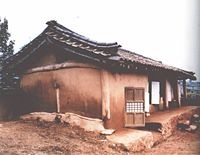
Reckoning by the lunar calendar, by which many Korean people record their birthdays, Sun Myung Moon was born on January 6, 1920 (February 25, 1920 C.E.), in Sangsa-ri (상사리, 上思里), Deogun-myun (덕언면, 德彦面), Jeongju-gun (정주군, 定州郡), North P'yong'an Province (평안북도, 平安北道), Korea (now in North Korea), the fifth of eight children who lived past childhood in the family of Moon, Kyeungyoo (문경규, 文慶裕) and Kim Kyung-gye (김경계, 金慶継), who gave him the name Yongmyung (문용명, 文龍明). People from North P'yong'an Province are known for their strong and stubborn natures. Many important figures in the Korean Independence movement came from this area. As a young boy, Yongmyung was known for his strong sense of justice and for his reputation for tackling difficult tasks and sticking with them.
In 1920, Korea was already under the control of Japan. Reverend Moon was born to a rural family. If he had lived even a few decades earlier, he very likely would not have had the opportunity to obtain a formal education, since education during the Joseon period (1392-1897) was available almost solely to sons of the Yangban, or noble class. It was the influence of Protestant, Christian missionaries, with missions in Korea starting from the late 1880s, that allowed for the expansion of educational opportunities to include all classes, even girls. Attending the local sodang, or Confucian primary school, Moon's early years of study included learning to read and write the Chinese characters that were used for all scholarly works in that time. He was taught to master key works of Confucian and other classic literature. It was held that these texts contained the wisdom through which citizens in Confucian society learned how to live, especially how to relate to others. One of the most important elements in Confucian teaching is the view that no life exists in isolation from others, and that it is crucial to keep the proper relationships with the key persons in one's life, such as one's King, parents, siblings, children, spouse, and friends.
In 1920, Korea was already under the control of Japan. Reverend Moon was born to a rural family. If he had lived even a few decades earlier, he very likely would not have had the opportunity to obtain a formal education, since education during the Joseon period (1392-1897) was available almost solely to sons of the Yangban, or noble class. It was the influence of Protestant, Christian missionaries, with missions in Korea starting from the late 1880s, that allowed for the expansion of educational opportunities to include all classes, even girls. Attending the local sodang, or Confucian primary school, Moon's early years of study included learning to read and write the Chinese characters that were used for all scholarly works in that time. He was taught to master key works of Confucian and other classic literature. It was held that these texts contained the wisdom through which citizens in Confucian society learned how to live, especially how to relate to others. One of the most important elements in Confucian teaching is the view that no life exists in isolation from others, and that it is crucial to keep the proper relationships with the key persons in one's life, such as one's King, parents, siblings, children, spouse, and friends.
Religious life and call to mission
Confucian ethics had prevailed throughout the entire Joseon period, largely to the exclusion of Buddhism, Christianity, and other religions. Under some Joseon monarchs (especially in the early years), Buddhists and Catholic and Protestant Christians were severely persecuted and even killed. Only after the 1880s did it become been safe to practice Christianity in Joseon Korea. Many members of Sun Myung Moon's family became members of the local Presbyterian church, the same church that Sun Myung and his brother also began to attend (he was 11 years old at the time). Like many Christians in Korea at that time, Sun Myung Moon would have spiritual encounters with Jesus during prayer. He had a particularly dramatic encounter on Easter Sunday in 1935, that determined the direction of the rest of his life. In prayer on a hill near his home, he relates that Jesus Christ appeared to him and asked him to devote his life to the service of God and to take on the continuation of Jesus' mission of bringing salvation to the world. Reverend Moon reports having tried three times to reject this mission (realizing the hardship it would entail), but surrendered to Jesus' insistence on Jesus' third try.
Study and worship in Seoul
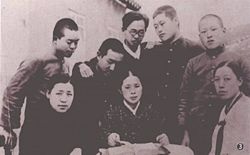
After graduation from the sodang in 1938, Moon planned to become a teacher, and applied to the Normal School in Pyeongyang, but was rejected because he was colorblind. Instead, he traveled south to Seoul and entered the Kyeongsong Institute of Commerce and Industry, founded a few years earlier as part of the Japanese educational system installed in Korea by the Japanese government. (Japan governed Korea following Korea's annexation by Japan in 1910.)
While a student in Seoul, Moon attended services at several churches, including one of the first Pentecostal churches in Korea. Later, he attended the Heuksong-dong congregation of the Jesus Church, a new church founded and organized by a local evangelist, Yong-do Lee. Evangelist Lee's ministry was filled with spirit, and sometimes his sermons would continue for four, six or even eight hours. Moon also served as a Sunday School teacher at the Myung Su Dae Church. Throughout his worship, prayer and studies, Sun Myung Moon's inner thoughts were constantly focused on how to accomplish what he had promised Jesus. He sought knowledge through nature, through his incessant study of the Bible, and through his prayerful "travels and encounters in the spiritual world." He studied the lives and teachings of saints and religious leaders, and read the Bible from cover to cover several times.
While a student in Seoul, Moon attended services at several churches, including one of the first Pentecostal churches in Korea. Later, he attended the Heuksong-dong congregation of the Jesus Church, a new church founded and organized by a local evangelist, Yong-do Lee. Evangelist Lee's ministry was filled with spirit, and sometimes his sermons would continue for four, six or even eight hours. Moon also served as a Sunday School teacher at the Myung Su Dae Church. Throughout his worship, prayer and studies, Sun Myung Moon's inner thoughts were constantly focused on how to accomplish what he had promised Jesus. He sought knowledge through nature, through his incessant study of the Bible, and through his prayerful "travels and encounters in the spiritual world." He studied the lives and teachings of saints and religious leaders, and read the Bible from cover to cover several times.
Study and activism in Tokyo
Following his graduation from the Kyeongsong Institute, Moon obtained permission to pursue further studies in Japan, and entered the technical high school under the auspices of Waseda University inTokyo, making the trip to Japan in 1941. With the shadow of World War II looming, the relationship between the Japanese occupation government in Korea and the Korean Christian Churches, which had always been tense, became even more strained. The Japanese government was wary of the Christian churches, because many of the most fervent activists in the Korean independence movement, which had been working to secure Korea's independence from Japan since their first demonstrations for freedom in 1919, were Christians. With the war getting closer, Japan ordered all Koreans, including the Christians, to worship at the Japanese Shinto shrines. The following year, in 1942, the foreign missionaries were ordered to return home, and all the Korean churches were directed to abandon their denominational affiliations and join the Japanese Christian Church. Ministers who were not willing to worship at the Shinto shrines or change denominations were imprisoned and sometimes killed. Koreans were also required to take Japanese names and speak Japanese instead of Korean.
Moon took the Japanese name Emoto Ryumei while studying in Tokyo. While there, he met other Korean students who supported the independence movement and the exiled Korean government in Shanghai. Whenever they gathered, Japanese plainclothes police officers would join the meetings to listen to what the rebel students were saying. Among Moon's friends in Tokyo were Christians and Communists. He could see that they were all trying to make the world a better place, although they had deep disagreements about how to go about it. He continued to study the Bible, in Japanese and English, as well as Korean. He disciplined himself in his studies and also trained himself to be able to endure many kinds of physical challenges, trying to work faster or harder than others, to survive on less food, to do the most difficult jobs. Many of his fellow countrymen hated the Japanese because their occupation of Korea was so stifling, but Moon felt that the enemy he had to fight against was not Japan, but the forces of evil, a much broader and more time consuming battle. He tried to love and serve the Japanese people, and prepare himself for the mission he had received, to battle against evil on behalf of all people.
Moon took the Japanese name Emoto Ryumei while studying in Tokyo. While there, he met other Korean students who supported the independence movement and the exiled Korean government in Shanghai. Whenever they gathered, Japanese plainclothes police officers would join the meetings to listen to what the rebel students were saying. Among Moon's friends in Tokyo were Christians and Communists. He could see that they were all trying to make the world a better place, although they had deep disagreements about how to go about it. He continued to study the Bible, in Japanese and English, as well as Korean. He disciplined himself in his studies and also trained himself to be able to endure many kinds of physical challenges, trying to work faster or harder than others, to survive on less food, to do the most difficult jobs. Many of his fellow countrymen hated the Japanese because their occupation of Korea was so stifling, but Moon felt that the enemy he had to fight against was not Japan, but the forces of evil, a much broader and more time consuming battle. He tried to love and serve the Japanese people, and prepare himself for the mission he had received, to battle against evil on behalf of all people.
Beginning of Reverend Moon's Ministry
Return to Korea
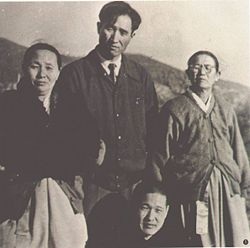
Reverend Moon had to shorten his course of study at the technical high school by six months because the war began to affect daily life in Japan. His class graduated in September 1943. As he prepared to return to Korea by boat, he felt a premonition of danger regarding the Kwon-non Maru, the boat he was scheduled to take, and changed his ticket at the last minute. As it happened, the Kwon-non Maru hit a mine and sank, drowning hundreds of passengers. His family knew he had planned to be on this boat, and naturally presumed he had been killed. They were astonished to see him walk up to his home a few days later.
Soon after returning to Korea, he married Sunkil Choi, in a traditional matchmaking arranged by the couple's parents. He and his bride moved to Seoul, to Heukseok-dong, where he had lived earlier as a student. Moon worked at a construction company as an electrical engineer.
A year later, he was arrested on suspicion of being a communist as a result of having made communist friends in Japan. He was severely tortured, to make him confess to being a communist, but he repeatedly stated that he was a Christian, and not a communist. After holding him in jail for a few weeks, the police finally concluded he was not a communist and he was released.
When Japan surrendered to the Allies on August 15, 1945 (celebrated today as Liberation Day in Korea), Korea was free of Japanese rule for the first time in nearly 40 years. Koreans were elated. Sun Myung Moon marks this day as the beginning of his public ministry. In the ten years since his encounter with Jesus, he had not spoken with anyone about the mission to which he had been called. But now, freed from the strict scrutiny of the Japanese occupation forces, he was free to teach what he believed. Nevertheless, he continued to attend church services, to study the Bible, and to persist in his search for answers about God, the world, and the purpose of human life.
Soon after returning to Korea, he married Sunkil Choi, in a traditional matchmaking arranged by the couple's parents. He and his bride moved to Seoul, to Heukseok-dong, where he had lived earlier as a student. Moon worked at a construction company as an electrical engineer.
A year later, he was arrested on suspicion of being a communist as a result of having made communist friends in Japan. He was severely tortured, to make him confess to being a communist, but he repeatedly stated that he was a Christian, and not a communist. After holding him in jail for a few weeks, the police finally concluded he was not a communist and he was released.
When Japan surrendered to the Allies on August 15, 1945 (celebrated today as Liberation Day in Korea), Korea was free of Japanese rule for the first time in nearly 40 years. Koreans were elated. Sun Myung Moon marks this day as the beginning of his public ministry. In the ten years since his encounter with Jesus, he had not spoken with anyone about the mission to which he had been called. But now, freed from the strict scrutiny of the Japanese occupation forces, he was free to teach what he believed. Nevertheless, he continued to attend church services, to study the Bible, and to persist in his search for answers about God, the world, and the purpose of human life.
Challenges in North Korea
In 1946, Reverend Moon left to take a short trip to Pyongyang, North Korea, the city where Korean Christianity was the most active. As the trip was meant to be short, he left his wife and infant son, who had been born earlier that year, at home. In Pyongyang, Reverend Moon began teaching, holding prayer services, and giving lectures. Often the sessions went late into the night. Eventually, he was arrested by North Korean authorities for disturbing the peace, and held in jail for several weeks and tortured. Though suspected of being a spy for the American military government in South Korea, he was finally declared innocent by a Soviet official and released. While in jail, he met some other Christians who felt they had been led to him as a special teacher or prophet. After his release, the people who had become disciples nursed him back to health, whereupon he continued preaching, teaching, and praying.
His teaching led him to be disliked by both the established Christian churches, because he was luring members away from them with his charismatic message, and by the anti-Christian communist authorities, because his congregation was too visible, and did not fit the mold of the established church, whom the authorities ignored if they kept to themselves and did not disturb society. In 1948, he was arrested again and charged with being a swindler, depriving people of their money with promises of spiritual rewards. This time he was found guilty, and sentenced to five years in a communist labor camp.
A five-year sentence to the Heungnam labor camp was, for all intents and purposes, a death sentence. Prisoners were worked to death. Labor was overwhelming and debilitating, rations were scant, and conditions horrid. Moon credits his own survival to God's protection over his life, his orientation for the welfare of others as greater than for himself, and his habit of saving half his meager water ration for washing the toxic chemicals off his skin after long days of work bagging and loading chemical fertilizer with his bare hands. While he was in the labor camp, the Korean War began. He had served 34 months of his sentence when he was liberated in 1950, after UN troops advanced on the camp and the guards fled, releasing all the prisoners who remained alive. The day of his release was the day he was to be publicly executed. His devotion to the United States (who led the UN forces), the United Nations, and the 16 nations (and Korean War veterans) whose soldiers fought for Korean liberation, has been unending, lifelong, and central pillar of Reverend Moon's gratitude and activities for his entire life.
After his release, rather than race to the South along with the streams of refugees, he spent 40 days searching for and gathering each one who had responded to him as a disciple. With them he traveled to Pusan, arriving January 28, 1951.
His teaching led him to be disliked by both the established Christian churches, because he was luring members away from them with his charismatic message, and by the anti-Christian communist authorities, because his congregation was too visible, and did not fit the mold of the established church, whom the authorities ignored if they kept to themselves and did not disturb society. In 1948, he was arrested again and charged with being a swindler, depriving people of their money with promises of spiritual rewards. This time he was found guilty, and sentenced to five years in a communist labor camp.
A five-year sentence to the Heungnam labor camp was, for all intents and purposes, a death sentence. Prisoners were worked to death. Labor was overwhelming and debilitating, rations were scant, and conditions horrid. Moon credits his own survival to God's protection over his life, his orientation for the welfare of others as greater than for himself, and his habit of saving half his meager water ration for washing the toxic chemicals off his skin after long days of work bagging and loading chemical fertilizer with his bare hands. While he was in the labor camp, the Korean War began. He had served 34 months of his sentence when he was liberated in 1950, after UN troops advanced on the camp and the guards fled, releasing all the prisoners who remained alive. The day of his release was the day he was to be publicly executed. His devotion to the United States (who led the UN forces), the United Nations, and the 16 nations (and Korean War veterans) whose soldiers fought for Korean liberation, has been unending, lifelong, and central pillar of Reverend Moon's gratitude and activities for his entire life.
After his release, rather than race to the South along with the streams of refugees, he spent 40 days searching for and gathering each one who had responded to him as a disciple. With them he traveled to Pusan, arriving January 28, 1951.
Early Church in Pusan
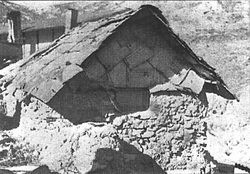
Pusan in the early 1950s was crowded with refugees who had fled from North Korea during the Korean War. Moon worked at a United States army base to support himself while he taught, preached, and collected disciples. One of his early disciples in Pusan, Hyowon Eu, was a good teacher and writer who collaborated with Moon to produce the first written version of his teachings, usually called the Divine Principle. This first version, titled Wolli Wonbon(never published, but there remains four extant handwritten manuscripts) was completed in May 1952. In March of 1954, Moon and his followers moved to Seoul.
In 1953, Moon decided that his birth name, Moon Yong Myungwas not a suitable name for a Christian evangelist because Yong,which means dragon, might be interpreted by some people as referring to serpent, devil, or the antichrist.So, he decided to change his name to Moon Sun Myung. The Chinese character for Moon(문, 文) means word or literature, while the character Sun (선, 鮮), composed of fish and lamb (symbols of Christianity), means fresh. The character Myung (명, 明), composed of sun and moon, means bright.Together, Sun-Myung means make clear. So the full name can be taken to mean the word made clear.
In 1953, Moon decided that his birth name, Moon Yong Myungwas not a suitable name for a Christian evangelist because Yong,which means dragon, might be interpreted by some people as referring to serpent, devil, or the antichrist.So, he decided to change his name to Moon Sun Myung. The Chinese character for Moon(문, 文) means word or literature, while the character Sun (선, 鮮), composed of fish and lamb (symbols of Christianity), means fresh. The character Myung (명, 明), composed of sun and moon, means bright.Together, Sun-Myung means make clear. So the full name can be taken to mean the word made clear.
Founding and early work of the Unification Church
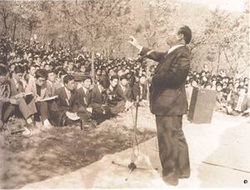
On May 1, 1954, Sun Myung Moon founded the Holy Spirit Association for the Unification of World Christianity (HSA-UWC), most often referred to as the Unification Church. His congregation was astonished when they heard the name that their teacher had chosen for the young church, because of its grandeur. They could not imagine how their tiny, young group could impact even Korea, let alone Asia or the world. The new church encountered difficulties right away. Established Christian churches and Christian schools objected whenever members decided to join Moon's church. As a way to oppose Moon, some reported to the authorities that he had evaded the draft. Moon was arrested once again, this time he was held for three months in the Seodaemun prison before being cleared of the charges and released.
All the while, the number of members steadily grew. In July, 1957, Reverend Moon sent pioneer Unification missionaries out to 116 cities and towns throughout Korea, and training programs for overseas missionaries were begun. In 1958, missionaries were sent to Japan, and in 1959, to the United States, and then Europe. Mission work was further expanded in 1975, when teams of missionaries including members from Japan, the United States, and Europe were sent to 120 new mission countries. In the early 1970s Rev. Moon and his family moved to the United States, where Rev. Moon toured the United States by road, speaking at evangelistic gatherings around the country. In this way he both shared and trained his followers on the path of missionary life.
Much of his evangelistic mission upon his arrival to the U.S. was to elevate American democratic ideals. He launched in the U.S. what he called the One World Crusade (OWC) in the 1970s, with a message he felt called America to its godly foundation and Christians to live "God’s way of life" and anticipate the second coming of Christ. These tours, entitled "New Hope for Christianity," the "Sun Myung Moon Christian Crusade," and finally the "God Bless America Festivals" (1972-1976) conveyed a pro-God, pro-family, pro-America, and anti-communist message.
Through the 1970s Unification Church in America experienced a dramatic growth spurt, from a few hundred to over 3,000, in addition to the hundreds of missionaries arriving in the U.S. from Japan and Europe. Parents and public reaction varied from polite positivity to outrage and opposition, and even violent and illegal assaults on adult children who had decided to join up with the revival work of Reverend Moon. Reverend Moon never responded to opposition with public counter-attacks or even explicit self-defense, but rather took proper and necessary steps to preserve the right of his own church to exist in America, to fund-raise and to be protected from deprogramming—the abduction and confinement of believers in order to break their faith.
Attacks intensified in the 1980s, culminating in Reverend Moon's arrest and trial by the U.S. government on charges of tax evasion. Many believe these charges were wholly without merit, and designed for the sole purpose of driving Moon from American soil.[3] At this point, many American Christian leaders saw this prosecution as a threat to the freedom of the clergy in general, and thousands of clergy rallied in support. After he was convicted, the government offered him the option of leaving America as a way to avoid prison time, but Rev. Moon refused, declaring that he would rather endure prison than abandon God's work in America.
Despite being sentenced, in 1982, to 18 months in prison, of which he served 13 months at the Danbury Correctional facility before being released on good behavior to a halfway house, Reverend Moon sought to love and serve his oppressor by establishing the Washington Times newspaper (1982) and the American Constitution Committee (ACC) (1987)—later to become the American Freedom Coalition and, after the fall of communism, the American Family Coalition (AFC). These and many other organizations, including the Women’s Federation for World Peace (formed 1992), were convened with the the mission to elevate the idealism and dispensational purpose for the democratic world, especially the United States.
All the while, the number of members steadily grew. In July, 1957, Reverend Moon sent pioneer Unification missionaries out to 116 cities and towns throughout Korea, and training programs for overseas missionaries were begun. In 1958, missionaries were sent to Japan, and in 1959, to the United States, and then Europe. Mission work was further expanded in 1975, when teams of missionaries including members from Japan, the United States, and Europe were sent to 120 new mission countries. In the early 1970s Rev. Moon and his family moved to the United States, where Rev. Moon toured the United States by road, speaking at evangelistic gatherings around the country. In this way he both shared and trained his followers on the path of missionary life.
Much of his evangelistic mission upon his arrival to the U.S. was to elevate American democratic ideals. He launched in the U.S. what he called the One World Crusade (OWC) in the 1970s, with a message he felt called America to its godly foundation and Christians to live "God’s way of life" and anticipate the second coming of Christ. These tours, entitled "New Hope for Christianity," the "Sun Myung Moon Christian Crusade," and finally the "God Bless America Festivals" (1972-1976) conveyed a pro-God, pro-family, pro-America, and anti-communist message.
Through the 1970s Unification Church in America experienced a dramatic growth spurt, from a few hundred to over 3,000, in addition to the hundreds of missionaries arriving in the U.S. from Japan and Europe. Parents and public reaction varied from polite positivity to outrage and opposition, and even violent and illegal assaults on adult children who had decided to join up with the revival work of Reverend Moon. Reverend Moon never responded to opposition with public counter-attacks or even explicit self-defense, but rather took proper and necessary steps to preserve the right of his own church to exist in America, to fund-raise and to be protected from deprogramming—the abduction and confinement of believers in order to break their faith.
Attacks intensified in the 1980s, culminating in Reverend Moon's arrest and trial by the U.S. government on charges of tax evasion. Many believe these charges were wholly without merit, and designed for the sole purpose of driving Moon from American soil.[3] At this point, many American Christian leaders saw this prosecution as a threat to the freedom of the clergy in general, and thousands of clergy rallied in support. After he was convicted, the government offered him the option of leaving America as a way to avoid prison time, but Rev. Moon refused, declaring that he would rather endure prison than abandon God's work in America.
Despite being sentenced, in 1982, to 18 months in prison, of which he served 13 months at the Danbury Correctional facility before being released on good behavior to a halfway house, Reverend Moon sought to love and serve his oppressor by establishing the Washington Times newspaper (1982) and the American Constitution Committee (ACC) (1987)—later to become the American Freedom Coalition and, after the fall of communism, the American Family Coalition (AFC). These and many other organizations, including the Women’s Federation for World Peace (formed 1992), were convened with the the mission to elevate the idealism and dispensational purpose for the democratic world, especially the United States.
Basic teachings
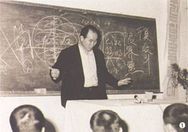
The basic elements of Sun Myung Moon's teaching have not changed since they were written down as the Divine Principle, in collaboration with Hyowon Eu, in the early 1950s. Scholars note that the teaching in the Divine Principle, while basically an interpretation of the Bible and Judeo-Christian history, also incorporates elements of Confucianism, which formed the background for Moon's early education. One of the most fundamental concepts in the Divine Principle its interpretation of Genesis 1:28, "Be fruitful and multiply… and have dominion over the fish of the sea…" as constituting Three Blessings. The Three Blessings represent God's command to all human beings:
- To grow to healthy maturity in body and spirit, where the body and spirit are integrated in mutual benefit and live in relation to the creator God, and for the sake of others;
- To establish an ideal family and expand that to instantiate true family love to all levels of social expansion, again always in relation to the creator God; and
- To maintain responsible stewardship of the earth and all of nature, and live a joyful and abundant physical life in preparation for an even more fantastic joy and abundance in eternal spiritual life.
Marriage, Blessing and Family
The role of ideal families in building world peace
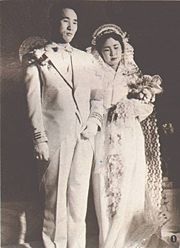
Reverend Moon's teaching gives highest regard for the family, which he calls the natural "school of love." God's love is expressed in the give and take of male and female. God created men and women to join together in marriage and create families in which we acquire the fullness of love and goodness. This is what Unification teaches regarding the Biblical second blessing. Children are meant to receive love from their parents—their food, warmth and care, and children naturally return love and joy to their parents in different ways as they grow from little infants all the way to old age. Siblings' love has the same eternal quality as does conjugal love and parental love. This the universal, eternal, ever dynamic and creative quality of family life—what Reverend Moon calls the "Four Realms of Heart." It is the life originally designated as the way for every person, and the ground from which our natural ease for goodness would be based.
Having traced the absence of ideal families to the human fall (above), which separated family life from God's co-creative presence, Reverend Moon teaches that "rebirth" as a family is necessary to correct our separation from God and restore us to God's lineage. To this end, Moon invites the people of this world to participate in the "Blessing," a ceremony of marriage dedication (or re-dedication) which cuts the bond to Satan and engrafts couples into "God's original blood lineage," and then to calls them to the mission of creating ideal families as the places to cultivate love.
In an ideal family, love has no boundaries. First, there should be deep understanding between family members—no fighting, no divorce, no jealousy, with all family members working for the common good of the family. Next, families will love and care for other families, and to work for the common good of their community. Next, communities will act for the benefit of other communities and work for the sake of the nation. Next, nations should understand and love other nations, working together for the common good of the world. In this way, cultivating true love in the family is seen as the starting-point for world peace.
This is the path to establishing "God's original ideal of creation" that was lost at the time of Adam, aborted with the premature execution of Lord Jesus, and successfully begun with Reverend and Mrs. Moon functioning as True Parents, restoring the position of "original human ancestors," and offering the "Blessing" whereby recipients can stand in and procreate "God's original blood lineage" and substantiate and expand its unending abundance of love in the world.
Having traced the absence of ideal families to the human fall (above), which separated family life from God's co-creative presence, Reverend Moon teaches that "rebirth" as a family is necessary to correct our separation from God and restore us to God's lineage. To this end, Moon invites the people of this world to participate in the "Blessing," a ceremony of marriage dedication (or re-dedication) which cuts the bond to Satan and engrafts couples into "God's original blood lineage," and then to calls them to the mission of creating ideal families as the places to cultivate love.
In an ideal family, love has no boundaries. First, there should be deep understanding between family members—no fighting, no divorce, no jealousy, with all family members working for the common good of the family. Next, families will love and care for other families, and to work for the common good of their community. Next, communities will act for the benefit of other communities and work for the sake of the nation. Next, nations should understand and love other nations, working together for the common good of the world. In this way, cultivating true love in the family is seen as the starting-point for world peace.
This is the path to establishing "God's original ideal of creation" that was lost at the time of Adam, aborted with the premature execution of Lord Jesus, and successfully begun with Reverend and Mrs. Moon functioning as True Parents, restoring the position of "original human ancestors," and offering the "Blessing" whereby recipients can stand in and procreate "God's original blood lineage" and substantiate and expand its unending abundance of love in the world.
Blessing ceremonies to build ideal families
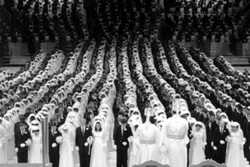
Starting in 1960, Rev. Moon has officiated over Blessing Ceremonies of ever increasing numbers of couples. The early Blessings were attended only by members of his Unification Church, while Blessings since 1992 have included people of all faiths and creeds. Here is a list of the major Blessing Ceremonies:
- 1960 1 + 3 couples: The first Blessing ceremony was held on April 11 1960, with Rev. Moon's blessing in marriage to Han Hak Ja, followed on April 16, by 3 couples from among his disciples.
- 1961 33 Couple Blessing (May 15, 1961): The 3 couples from 1960 and the 33 couples from 1961 are often referred to as the36 Couples, and are the elder members of the Unification Church
- 72 Couple Blessing (June 4, 1962)
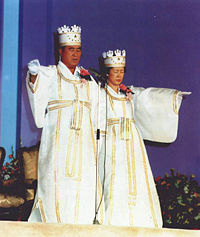
- 124 Couple Blessing (July 24, 1963)
- 430 Couple Blessing (February 22, 1968)
- 43 Couple Blessing (Held in three stages in Japan, the U.S., and England, in 1969): First group of non-Koreans to receive the Blessing
- 777 Couple Blessing (October 21, 1970): Including a large number of Japanese members and a few western members, following the work of missionaries who went to Japan from 1962, and to the U.S. starting in 1969.
- 1800 Couple Blessing (February 8, 1975): Including a larger number of Japanese and western members
- 118 Couple Blessing (May 21, 1978) London, England
- 2075 Couple Blessing (July 1, 1982, Madison Square Garden): First large scale Blessing ceremony to be held outside of Korea
- 6000 Couple Blessing (October 14, 1982)
- These July and October Blessings are considered one Blessing, called the 8,000 Couple Blessing)
- 6500 Couple Blessing (October 30, 1988) With participants from Korea, Japan, and other Asian countries
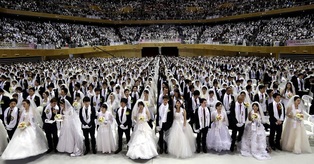
- 1275 Couple Blessing (January 12, 1989): With participants from 87 countries in Europe, Africa, and North & South America, the fruit of the missionary teams who went out in 1975
- 1267 Couple Blessing for Previously Married Couples (April 10, 1992): This was the first Blessing to include participants of other faiths
- 30,000 Couple Blessing (August 25, 1992): Included the first participants from former Soviet countries, participants from other faiths, and a large number of previously married couples, renewing their vows while making a commitment to create ideal families.
- 360,000 Couples (August 25, 1995): Held simultaneously in many locations around the world, connected by satellite to the main ceremony in Seoul)
- 400 Million Couples: Held in stages beginning in 1998, in ceremonies all around the world.